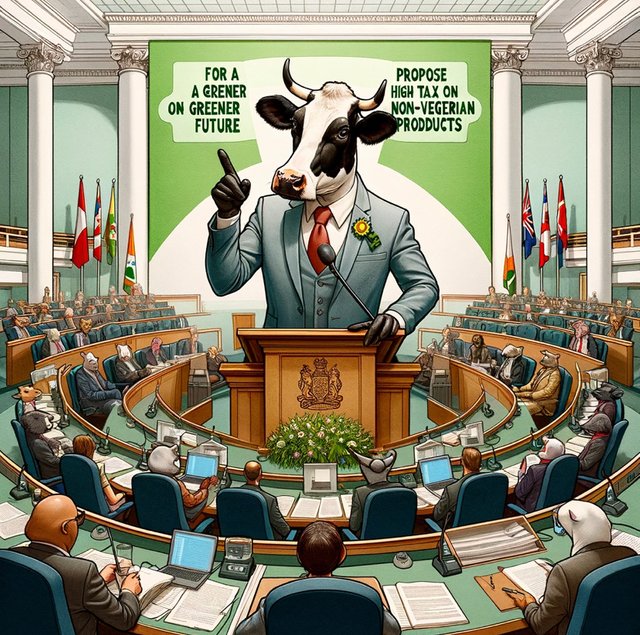Hello! Mats here, this is my very first post!
I saw the animal welfare topic and I thought that I couldn’t stay away from it!
Animals have always been exploited, and they will most likely always be.
It’s natural for any ecosystem to have energy flows from organisms that can perform photosynthesis (plants & algae) to herbivore animals and up to carnivore ones (their predators). In a sense, the species in the lower levels of this pyramid are always exploited by their predators. Non-photosynthesizing organisms need to exploit others’ lives in their continuous quest for survival; the more anyone lives, the more resources they will need.
Humans, as probably any other animal on Earth, have always been greedy for resources. We first want to be sure that we reach an acceptable standard of living and life security (housing, food and health are the basics). Then, we want to make sure that we’ll keep having access to them in the long-run, and this goes through subscribing to pension funds, social security programs and private investment. Once this is secured, people may start playing a pure game of status, trying to have the fanciest cars and houses (maybe even planes?), fantastic trips to the most trendy destinations, jewelry etc.
All great for the animals until here? Not really. One must think that lots of the resources that people spend as described above come from exploiting resources on Earth, including the animal ones. Capitalist incentives are high to do so (as long as there’s no “ethical regulation” imposed by the states).
The examples of such exploitation are countless. Think, for example, about how much extra effort bees need to produce the honey that we consume, in comparison to what they would need only for their survival. It goes similarly to cows and milk, for example. Horses, on their way, might have to work hard throughout their lives: lifting 30% more weight than just themselves, having to wear saddles and martingales etc.
The most remarkable one is, however, their life.
So many animals are killed every day just for us to eat them! In many cases, this is done completely regardless of their suffering, but few people are aware of it, or maybe few people think about it when they’re enjoying some good meat / fish at a nice restaurant, for example: it’s easy to detach the final product from its darker origins in our current society.
If we think back about the energy flows between species, something pops out: it’s very energetically inefficient to eat animals! From an intuitive perspective, how would we get the most energy: by eating a chicken that eats corn or by directly eating corn at their place? All the energy that powers a chicken’s life, needed for having its meat, comes from the corn too, and most of it won’t be used for the development of their bodies.
If we redirected all the arable land to produce human food (instead of feeding other animals that are here just to be killed in some months), much more would be left.
It’s necessary to recognize that this is not the only way to take to be more optimal in feeding humanity. For instance, there is a lot of food waste through the entire supply chain: some is lost in the storage phase in silos, some is damaged during transportation, some can’t be sold by retailers (especially the most perishable food!) and some of what is bought finally gets to the expiry date before being consumed (shoutout to everyone who lives alone!). Moreover, some regions on Earth are not proper for agriculture (think about places with more mountains/hills, or more desert ones), and maybe in those cases it would be better for humans to let animals eat the vegetation from such places and then consume them.
However, the global picture still leaves me with a feeling of unfairness towards consuming animal flesh, and this was one of the reasons why I chose to become vegetarian ~3 years ago. I was also influenced by some vegetarian friends (especially a crush of mine :)), and persuaded by the healthier lifestyle (both for me and for the environment) and by the inherent beauty of doing so. Moreover, I got sort of traumatized after eating magret de canard, while duck is my fav animal.
All of this made me want to see an offsetting mechanism for animal eaters. In Switzerland, for example, meat is quite expensive and relatively inaccessible for lower-income people. To popularize this, one might think of creating a high tax on non-vegetarian products, just like this cute deputy cow did:

Thank you for reading! I’m looking forward to reading your opinions in the comments section ;))
Have a great day,
Mats.
Hi, @matst Greetings!!
Warmly Welcome to your engagement participation in Steem of Animals Community. But, Unfortunately I can't able to review your post because your first introduction achievement post is still pending to approve. Please varified yourself first then start blogging. Good luck.
Kind Regards 💐
@uzma4882
Downvoting a post can decrease pending rewards and make it less visible. Common reasons:
Submit